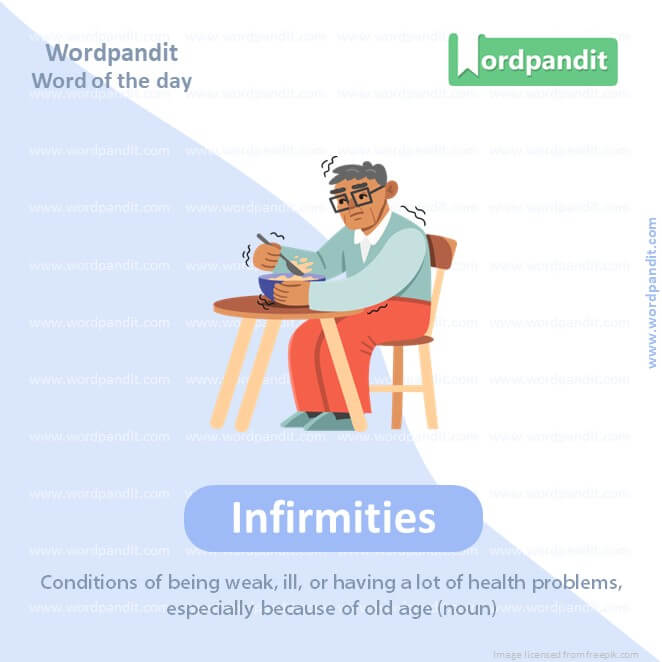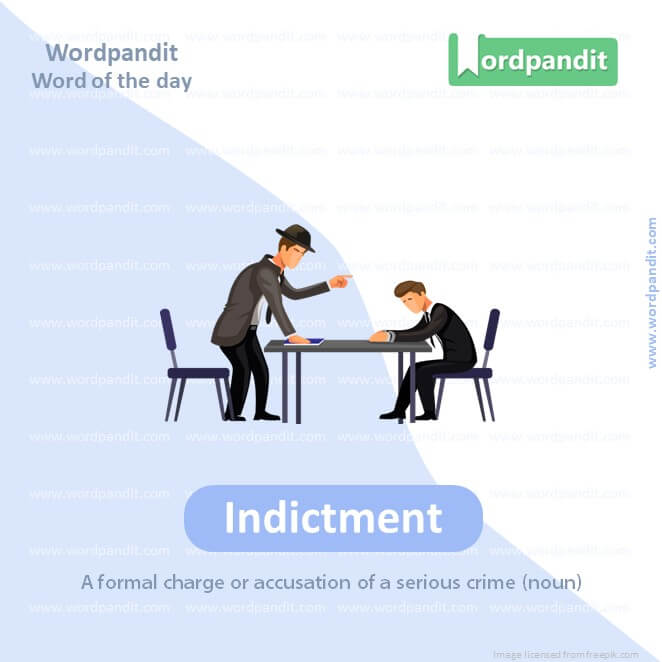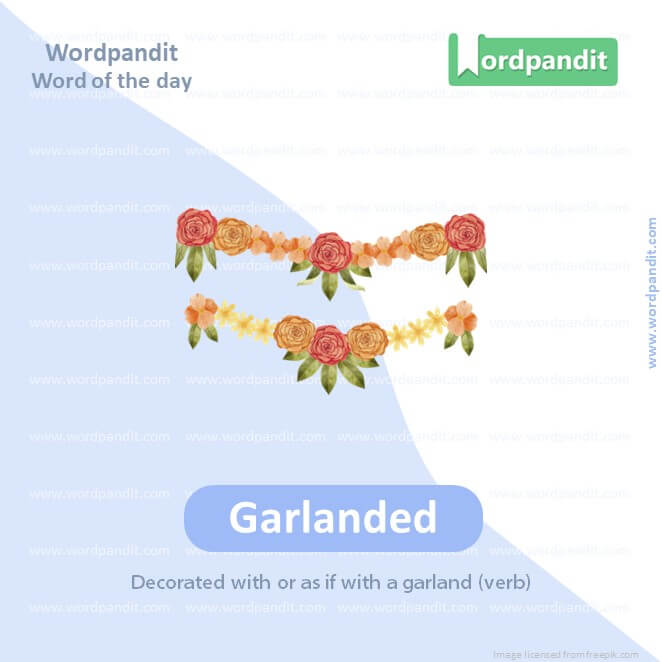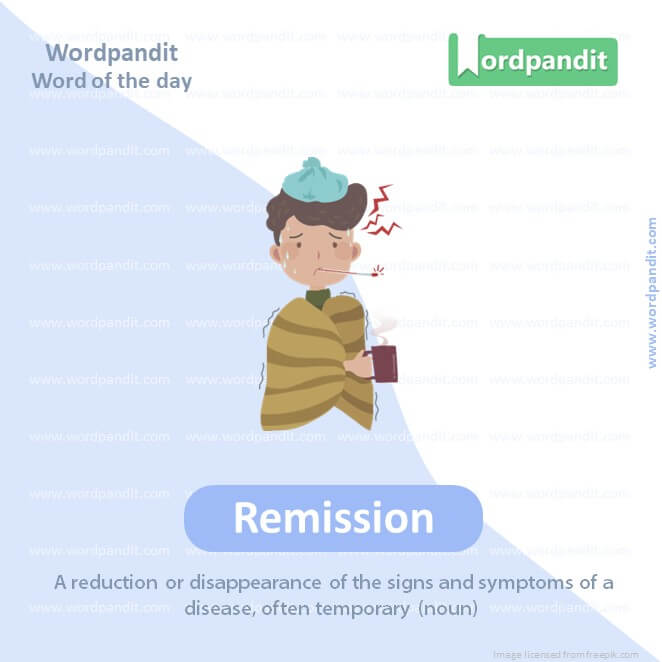Daily Vocabulary Words: List of Daily Used Words
Hi there. Welcome to this special section @ Wordpandit.
Our endeavour here is straightforward: highlighting important daily vocabulary words, you would encounter in The Hindu. This is your repository of commonly used words; essentially, we are posting a list of daily used words. Hence, this has significant practical application as it teaches you words that are commonly used in a leading publication such as The Hindu.
Visit the website daily to learn words from The Hindu.

WORD-1: Infirmities
CONTEXT: As a part of smart governance, the present government has addressed the problem of infirmities and out-datedness in laws by suitable amendments in the laws and their updation to a large extent.
SOURCE: The Hindu
EXPLANATORY PARAGRAPH: Imagine if someone often feels weak or sick and can’t do things like running or jumping easily. That’s what “infirmities” means. It’s like having boo-boos or owies that make you feel not so strong.
MEANING: Conditions of being weak, ill, or having a lot of health problems, especially because of old age (noun).
PRONUNCIATION: in-fur-muh-tees
SYNONYMS: Ailments, Weaknesses, Disabilities, Illnesses, Impairments.
USAGE EXAMPLES:
1. Grandma’s infirmities make it hard for her to walk up the stairs.
2. He spoke about the infirmities of old age with a sense of humor.
3. Despite her infirmities, she maintains a positive attitude.
4. The medical team specializes in treating the infirmities of elderly patients.

WORD-2: Envisaged
CONTEXT: These new Indian penal laws have been envisaged to shed the colonial law legacy and, at the same time, rid the penal laws of infirmities and update them to modern thinking in the field.
SOURCE: The Hindu
EXPLANATORY PARAGRAPH: “Envisaged” is like imagining or thinking of something in your mind, like how you might imagine a castle or a superhero.
MEANING: Thought of or imagined something as a future possibility (verb).
PRONUNCIATION: en-viz-uhjd
SYNONYMS: Imagined, Pictured, Visualized, Foreseen, Anticipated.
USAGE EXAMPLES:
1. She envisaged a world full of peace and happiness.
2. The new city plan envisaged a big park in the center.
3. He never envisaged becoming a famous actor.
4. The project was envisaged to take three years to complete.

WORD-3: Indictment
CONTEXT: The Supreme Court of India verdict quashing the orders releasing 11 men convicted for the heinous gang-rape and murder of several members of a family during the Gujarat pogrom in 2002 is an unequivocal indictment of the State government.
SOURCE: The Hindu
EXPLANATORY PARAGRAPH: “Indictment” is like saying someone did something wrong, and now they might have to go to court to see if it’s true.
MEANING: A formal charge or accusation of a serious crime (noun).
PRONUNCIATION: in-dite-ment
SYNONYMS: Accusation, Charge, Allegation, Prosecution, Arraignment.
USAGE EXAMPLES:
1. The grand jury issued an indictment against the criminal.
2. His speech was a strong indictment of government policies.
3. She faced an indictment for fraud.
4. The indictment included several charges of corruption.

WORD-4: Garlanded
CONTEXT: A disgraceful story that began with the Bharatiya Janata Party government facilitating their premature release and the freed men being garlanded by their supporters has now ended with the Court directing them to return to prison within two weeks.
SOURCE: The Hindu
EXPLANATORY PARAGRAPH: “Garlanded” is like when someone puts a circle of flowers around your neck or on your head, like a flower necklace or crown.
MEANING: Decorated with or as if with a garland (verb).
PRONUNCIATION: gar-lan-ded
SYNONYMS: Adorned, Festooned, Bedecked, Embellished, Decorated.
USAGE EXAMPLES:
1. The winner was garlanded with a wreath of flowers.
2. The hall was garlanded with streamers for the party.
3. She was garlanded as the festival queen.
4. Trees were garlanded with lights during the festival.

WORD-5: Remission
CONTEXT: The verdict is based on the ground that Gujarat did not have any jurisdiction to decide on granting remission to convicts sentenced in Maharashtra.
SOURCE: The Hindu
EXPLANATORY PARAGRAPH: “Remission” is when something bad, like being sick, gets better or stops for a while, and you feel good again.
MEANING: A reduction or disappearance of the signs and symptoms of a disease,
often temporary (noun).
PRONUNCIATION: re-mish-un
SYNONYMS: Abatement, Easing, Alleviation, Reduction, Relief.
USAGE EXAMPLES:
1. The patient’s cancer was in remission.
2. After the treatment, she experienced a period of remission.
3. The remission of symptoms brought him relief.
4. They hoped for a remission in the severity of the illness.
WORD-6: Usurpation
CONTEXT: In citing the Court direction as the reason for it to pass orders in favour of the convicts, the State government was guilty of usurpation of power, the Bench said.
SOURCE: The Hindu
EXPLANATORY PARAGRAPH: “Usurpation” is like taking something that doesn’t belong to you, especially when it’s something important like a chair or a toy that someone else is supposed to have.
MEANING: The act of taking someone’s power or property by force or without the right (noun).
PRONUNCIATION: yoo-sur-pay-shun
SYNONYMS: Seizure, Appropriation, Takeover, Encroachment, Annexation.
USAGE EXAMPLES:
1. The king’s throne was taken by usurpation.
2. The usurpation of power by the military was unexpected.
3. He viewed the new policy as a usurpation of his rights.
4. Her usurpation of the lead role caused controversy.
WORD-7: Reiteration
CONTEXT: it is a timely reiteration of the core principles that animate exercise of the power to grant remission — that it should be fair and reasonable and based on a set of relevant parameters such as whether the crime involved affected society at large, whether the convict retained the potential for committing similar offences or is capable of reform.
SOURCE: The Hindu
EXPLANATORY PARAGRAPH: “Reiteration” is like saying something again and again, the same way, so that everyone can remember it.
MEANING: The act of saying or doing something again, often for emphasis or clarity (noun).
PRONUNCIATION: ree-it-uh-ray-shun
SYNONYMS: Repetition, Restatement, Repetition, Echo, Recapitulation.
USAGE EXAMPLES:
1. His speech involved the reiteration of his main points.
2. The teacher’s reiteration helped the students understand.
3. The document included a reiteration of the company’s policy.
4. Her reiteration of the rules ensured everyone understood.
WORD-8: Preliminary
CONTEXT: The investigation report will identify these and we can expect the preliminary report in a fortnight, unlike accident reports in India which take months and years.
SOURCE: The Hindu
EXPLANATORY PARAGRAPH: “Preliminary” is like the first part of something, or the beginning steps you do before the main part, like putting on your shoes before going outside.
MEANING: Coming at the beginning; serving as a preparation or introduction (adjective).
PRONUNCIATION: pre-lim-in-air-ee
SYNONYMS: Initial, Introductory, Early, Preparatory, Commencing.
USAGE EXAMPLES:
1. The preliminary round of the competition was tough.
2. They conducted preliminary tests on the new device.
3. The preliminary results look promising.
4. She made some preliminary sketches for the painting.
WORD-9: Unpressurised
CONTEXT: The plane was permitted to depart as an unpressurised flight and was allowed just one take off and one landing.
SOURCE: The Hindu
EXPLANATORY PARAGRAPH: “Unpressurised” is like being relaxed and not feeling like you have to hurry or worry about something.
MEANING: Not subjected to pressure or stress; relaxed (adjective).
PRONUNCIATION: un-pres-yur-ized
SYNONYMS: Relaxed, Calm, Stress-free, Easygoing, Unforced.
USAGE EXAMPLES:
1. The unpressurised environment helped him focus.
2. She preferred an unpressurised approach to learning.
3. The unpressurised cabin made the flight more comfortable.
4. Working in an unpressurised atmosphere was a relief.
WORD-10: Proactively
CONTEXT: A disturbing fact is the failure of the Air India management to act proactively on a report by the instructor who trained the captain.
SOURCE: The Hindu
EXPLANATORY PARAGRAPH: “Proactively” is like doing something before you need to, like packing your school bag the night before.
MEANING: In a way that involves taking action by causing change and not only reacting to change when it happens (adverb).
PRONUNCIATION: pro-ak-tiv-lee
SYNONYMS: Anticipatively, Preemptively, Preventatively, Ahead of Time, Pre-emptively.
USAGE EXAMPLES:
1. She proactively prepared for the meeting.
2. Proactively managing your time can reduce stress.
3. They took a proactive stance in solving the problem.
4. He believes in proactively addressing issues.
Vocabulary Pronunciation
The dance of language learning comprises two inseparable partners: vocabulary and pronunciation. The rhythm of this dance is best enjoyed when both partners are in sync. Essentially, mastering ‘vocabulary pronunciation’ is key to expressing and understanding a language effectively. However, what is the ideal approach to learn ‘vocabulary pronunciation’?
Firstly, the process of learning ‘vocabulary pronunciation’ isn’t a sprint. Rather, it’s a marathon where consistency is vital. A gradual and steady pace of learning new words and their pronunciation offers enough time to effectively practice and commit them to memory.
Secondly, to master ‘vocabulary pronunciation’, go beyond written text. Dwell in the world of audible language, such as documentaries, podcasts, music, or language-learning apps that provide pronunciation guides. These memorable auditory experiences aid in refining your ‘vocabulary pronunciation’ and offer a glimpse into the authentic sounds of the language.
Another beneficial strategy for learning ‘vocabulary pronunciation’ involves the use of phonetic transcriptions. They offer systematic approaches to understanding the sound system of a language, thereby improving pronunciation.
Most importantly, do not shy away from practicing your ‘vocabulary pronunciation’. Be it in a language exchange meeting, a conversation with a native speaker, or even a self-recording session, active verbalization massively boosts your pronunciation prowess.
Lastly, always remember to train your ears as much as you train your tongue. Listening carefully to native speakers helps you capture the subtleties of ‘vocabulary pronunciation’, contributing to better delivery when you speak.
In conclusion, mastering ‘vocabulary pronunciation’ is not an overnight journey. It’s a process of intentional practice, sustained listening, conscientious reflection and active usage. As you chart this course with diligence and patience, you will witness your ‘vocabulary pronunciation’ skills blossom, leading you to communicate with greater fluency and confidence.













